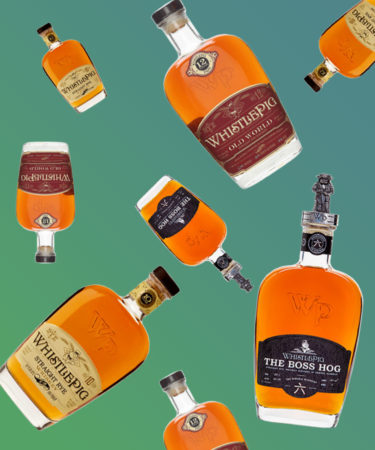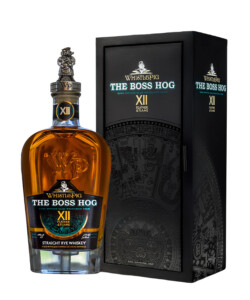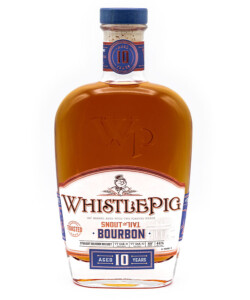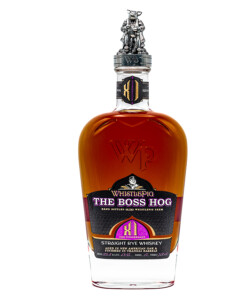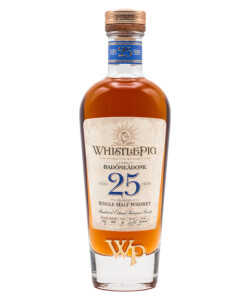WhistlePig is relatively young in the whiskey world. Founded in 2008 by Raj Peter Bhakta, the Vermont-based brand released its first bottling in 2015.
In a few short years, WhistlePig has become a well-known brand, offering the most-awarded rye whiskey in the world. Here are 10 more things you should know about WhistlePig.
WhistlePig is part Canadian.
WhistlePig was founded when Bhakta purchased a 150-year-old barn on a farm in Shoreham, Vt., but initially, its whiskey wasn’t homegrown. WhistlePig purchased a stock of 10-year-old blendable whiskey from a Canadian distillery to kick off the business.
WhistlePig loves nature.
The farm distillery is located on a 500-plus-acre farm, where it grows and harvests rye grain and raises a lot of animals. Kunekune pigs, sheep, goats, horses, and bees are all part of the WhistlePig family farm. The property also includes 20 acres of maple trees, which the distillery uses to make maple syrup.
WhistlePig owes a lot to Dave Pickerell.
The late Dave Pickerell, former master distiller of WhistlePig, was instrumental in creating the WhistlePig brand. He hooked up WhistlePig with its first stock of Canadian whiskey, helped create the brand’s first blend, WhistlePig 12 Year Old World Cask Finish Rye, and designed WhistlePig’s copper pot still, which the distillery still uses daily.
In 2018, WhistlePig lost a legend.
In November 2018, Pickerell tragically passed away while attending WhiskyFest in San Francisco. The industry collectively mourned his passing.
He indeed was a whiskey legend. Prior to founding WhistlePig, Pickerell served a 14-year term with Maker’s Mark. Additionally, his consultancy firm, Oak View Spirits, helped hundreds of distilleries open around the globe.
WhistlePig rye made a worldwide splash.
WhistlePig produces six whiskies, all of which are made using aged rye stock purchased from Alberta, Canada. Its first label, 10 Year, released in 2015, is a blend of that whiskey aged in new American oak barrels. It’s also the most-awarded rye in the world, according to the company.
WhistlePig’s other aged blends include 12 Year, 15 Year, and 18 Year. PiggyBack, created by Pickerell and released in 2018, is WhistlePig’s first 100 percent rye whiskey, aged six years. FarmStock is the first WhistlePig whiskey made with a majority of its own rye. Finally, there is The Boss Hog — more on that later.
WhistlePig trademarked Triple Terroir.
In 2017, WhistlePig debuted its FarmStock Rye, a limited-edition label made with the distillery’s own grain, wood, and even water. Thus, the term “Triple Terroir Whiskey” was born and trademarked.
FarmStock Rye Crop No. 003 marked a milestone for WhistlePig as the first label made using a majority of its own whiskey. It’s comprised of 52 percent of 3-year-old rye made with grain grown on the farm, plus 31 percent of 6-year-old whiskey, and 17 percent of 10-year-old whiskey from Alberta, Canada. The whiskey is aged in WhistlePig’s custom Vermont White Oak barrels, and distilled and proofed with water from the property.
WhistlePig bottled a Samurai Scientist.
Boss Hog is an annually released, single-barrel, barrel-strength rye. The 2019 version, “The Boss Hog Edition 六: The Samurai Scientist” was the first American whiskey finished using Japanese Umeshu, according to WhistlePig. The bottle is a collaboration between WhistlePig and Japan’s Kitaya brewery, of Kyushu island.
You can chase your WhistlePig with Ben & Jerry’s.
WhistlePig has two tasting rooms, one at the farm distillery and the other inside Vermont Artisan Coffee & Tea in Waterbury Center, Vt. Ben & Jerry’s is located next door to the latter location.
Planning a visit? Make a day of it by visiting WhistlePig on the Middlebury Tasting Trail.
You can make your own WhistlePig.
Through its Reserve Barrel program, deep-pocketed fans can create their own personal WhistlePig whiskey. You choose the expression and complete the look with your name handwritten on the label.
Like whiskey, WhistlePig is always evolving.
In 2019, WhistlePig announced a partnership with BDT Capital Partners, a Chicago-based firm that became a “significant” minority equity partner in the brand, according to Vermont Business Magazine. At that time, Bhakta, who had retired from the company in 2017, fully exited his remaining stake in the brand.
